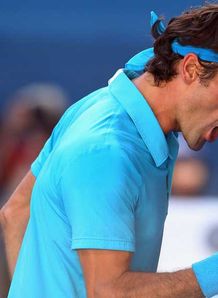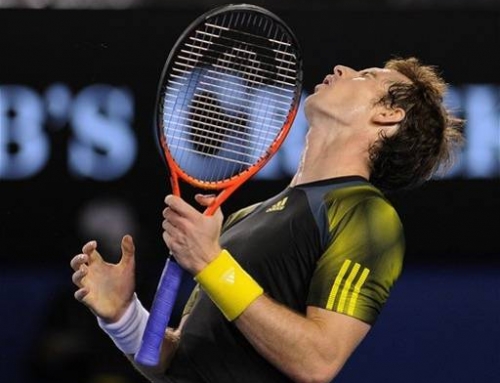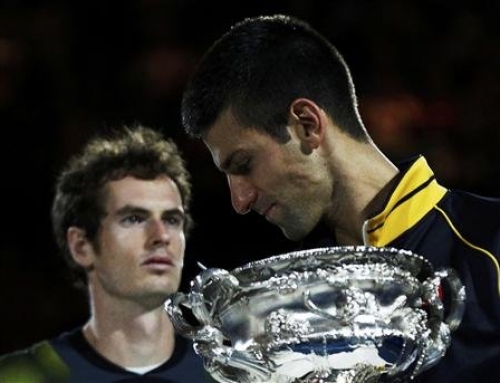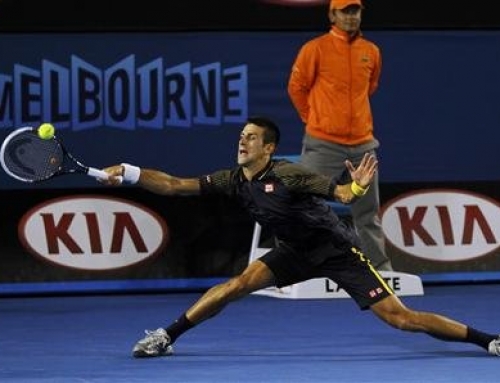 Think about it. Roger Federer had a sublime moment, soundly beating his long-term rival, Lleyton Hewitt, his 15th consecutive win. This was Federer at his most confident, playing an opponent he has few worries playing. Hewitt won his first Slam title in 2001, a US Open win over Pete Sampras. He won his second in 2002, a Wimbledon win over David Nalbandian. Although Hewitt reached two more Slam finals in 2004 and 2005, he hasn’t been close in 5 years.
Think about it. Roger Federer had a sublime moment, soundly beating his long-term rival, Lleyton Hewitt, his 15th consecutive win. This was Federer at his most confident, playing an opponent he has few worries playing. Hewitt won his first Slam title in 2001, a US Open win over Pete Sampras. He won his second in 2002, a Wimbledon win over David Nalbandian. Although Hewitt reached two more Slam finals in 2004 and 2005, he hasn’t been close in 5 years.
This is typical of players that win Slams. They win at an early age, and then sometimes they continue to win, a la Federer, and sometimes they fade, like Courier or Hewitt.
Although Nikolay Davydenko has been in the top 10 for many years, even ranked as high as number 3, at age 28, he is perhaps playing his best tennis. He’s striking the ball better than ever. He’s increased the pace of his serve. He’s improved his mental toughness, formerly a weakness. He’s improved his volleying skills.
Maybe he should have reached this point a few years ago, in his mid 20s, rather than so late in his career. It probably hurt Davydenko’s career when he got embroiled in a match fixing scandal, one that he was eventually cleared of. Once this distraction was past, Davydenko has been making up for lost time, raising the level of his game. These days, he kids that he needs the money to pay for his wife’s spending habits.
It’s so incredibly rare to find a player playing well late in their careers that it’s hard to think of anyone like that. One might point to Andre Agassi, except he found success early in his career. Even if he didn’t win his first Slam right away, he was in semifinals and finals of majors very early on. There are players like James Blake or Mardy Fish or Ivo Karlovic or Radek Stepanek that have played better as they’ve gotten older, but not to the same level as Davydenko who has improved his game so much that he’s a threat to beat any top player. As good as Stepanek is playing now, he’s not a serious threat to beat top players on a consistent basis.
Unlike Agassi, Davydenko has never reached the final of a Slam. Even so, coming into the quarterfinal, he had to feel good about his chances to win his first Slam or at least get past Federer. He had beaten Federer two times in a row, once in the ATP World Tour Finals and once again in Doha.
And the match couldn’t have started better. Davydenko started the match blasting returns. Every service game, Federer found himself down break points, unable to get easy points on serve, and making errors, as Davydenko was pounding winners. In a shocking turn of events, Davydenko had taken the first set, 6-2, and Federer had to be panicking that maybe he was making his earliest exit from a Slam in years.
Davydenko started the second set much like he started the first, getting an early break and leading 3-1. On Roger’s serve, he again had break points to get up to a two break lead. Davydenko got into a rally and was ready to approach the net off a backhand, when he netted the shot. Up to this point, things looked really shaky for Federer. Going down a second break would likely mean losing the second set.
By this point, the sun had set low enough that the entire court was in shade. The match had started with the sun slowly setting, the court half in sun, half in shade. When this happened, things started to favr Federer. Commentators speculated that the court slowed down which made it easier for Federer to deal with Davydenko. Federer claimed it was not the speed of the court that bothered him, but the court being half in the sun and half in shade, which made it tough for him to see the ball properly. He was biding his time until the whole court was in shade when he could see the ball.
Federer didn’t do anything particularly different to turn things around at 3-1 down. He started hitting the ball down the middle and got a few more balls in play, while Nikolay cooled down tremendously. From 3-1 down, Davydenko lost the set 6-3, then the next set, 6-0, then was down 2-0 before he won another game.
Where Davydenko was hardly missing, he began netting balls or hitting them wide. Where Davydenko was seeing Federer’s serve well and attacking on return, he found it tough to see the serve. Federer began holding serve without much trouble. By the start of the fourth set, Davydenko felt pressure to win at least one game on serve to stem the tide that was leaving him reeling. Although he had chances to win his first service game, Davydenko ended up netting an overhead and eventually losing yet another game to go down 2-0.
Finally, Davydenko broke back and tied the set and started to play a bit better, getting back into rallies. By this point, Federer was hitting pretty good, and secured a second break. He was ready to serve out the match at 5-4, when Davydenko hit some incredible returns and broke back. Federer played tough again and broke a second time, to 6-5, then served brilliantly to take the set and match, 7-5.
This match had critical consequences to the number 1 ranking. Had Federer lost and Djokovic won the tournament, it would be Djokovic that would become number 1. The point became moot once he won the match. Federer will be number 1 regardless of what happens, at least, after the Australian Open.
And with this victory, Federer reaches his 23rd consecutive semifinal in a row, a streak that dates back to Wimbledon of 2004. The streak has lasted over 5 years. To stay that consistent over so many years is incredible, and Davydenko was a serious threat to breaking that record. Federer, as usual, was confident as ever, feeling that even if he had lost the second set, he would still be able to beat Davydenko because his game play would eventually go down, and he would win with superior conditioning and mental toughness.
It helped Federer tremendously that he was on a huge run. Even when Davydenko came back, Federer had already gotten a feel for the ball and wasn’t missing the ball wildly, so he was able to stay in most points and not give away games on errors.
One more quarterfinal to go. In a replay of the 2008 final, Novak Djokovic will play Jo-Wilfried Tsonga.






![[Aussie Open Final] Can Andy Murray beat Novak Djokovic?](https://www.essentialtennis.com/wp-content/uploads/2013/01/20130126andy-500x383.jpg)
![[Day 13, Aussie Open] Bryan brothers win 13th Slam with Aussie doubles title, Kyrgios wins boys title](https://www.essentialtennis.com/wp-content/uploads/2013/01/20130125bryan-500x383.jpg)